If you want to strengthen your faith and understanding, check out these five Christian apologetics books. Start with *Evidence That Demands a Verdict* for a thorough look at biblical truths. Next, *The Big Book of Christian Apologetics* offers quick, accessible insights. *Mere Christianity* presents engaging reflections on morality, while *I Don't Have Enough Faith to Be an Atheist* combines science and theology for a compelling case for God's existence. Finally, the *Handbook of Christian Apologetics* balances logic with clarity on key topics. Each book invites you to explore deeper, enriching your spiritual journey.
Evidence That Demands a Verdict: Life-Changing Truth for a Skeptical World
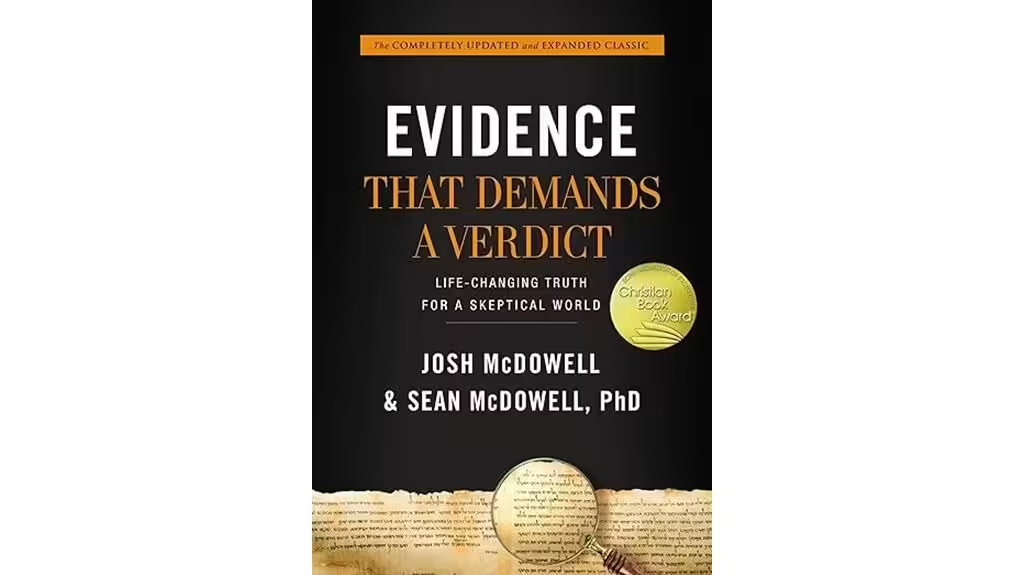
If you're a parent worried about your child's faith as they head off to college, "Evidence That Demands a Verdict" is an invaluable resource you should consider. This book dives deep into the evidence supporting Christianity, addressing doubts that many students face. It's structured into four parts, covering everything from biblical evidence to historical truths. As I explored its archaeological findings, I found it reassuring that no discovery contradicts Scripture. The book not only strengthens faith but also equips readers to tackle skepticism with confidence. Personally, I noticed a shift in my understanding, making it a must-read for anyone grappling with their beliefs. This updated edition is a powerful tool for defending faith amid a skeptical world.
Best For: Parents concerned about their children's faith during college years and individuals seeking evidence to support their belief in Christianity.
Pros:
- Well-researched evidence: The book provides a comprehensive examination of biblical and historical truths, making a strong case for Christianity.
- Addresses skepticism: It tackles common doubts and questions, empowering readers to engage in discussions about their faith.
- Transformative impact: Many readers report strengthened faith and a deeper understanding of their beliefs after reading the book.
Cons:
- Notable error: There is a significant error regarding the recognition of deuterocanonical books, which may affect credibility for some readers.
- Dense content: The extensive data and references might overwhelm those looking for a more straightforward read.
- Targeted audience: Primarily beneficial for Christians or those open to faith, which may limit its appeal to a broader audience.
The Big Book of Christian Apologetics: An A to Z Guide (A to Z Guides)
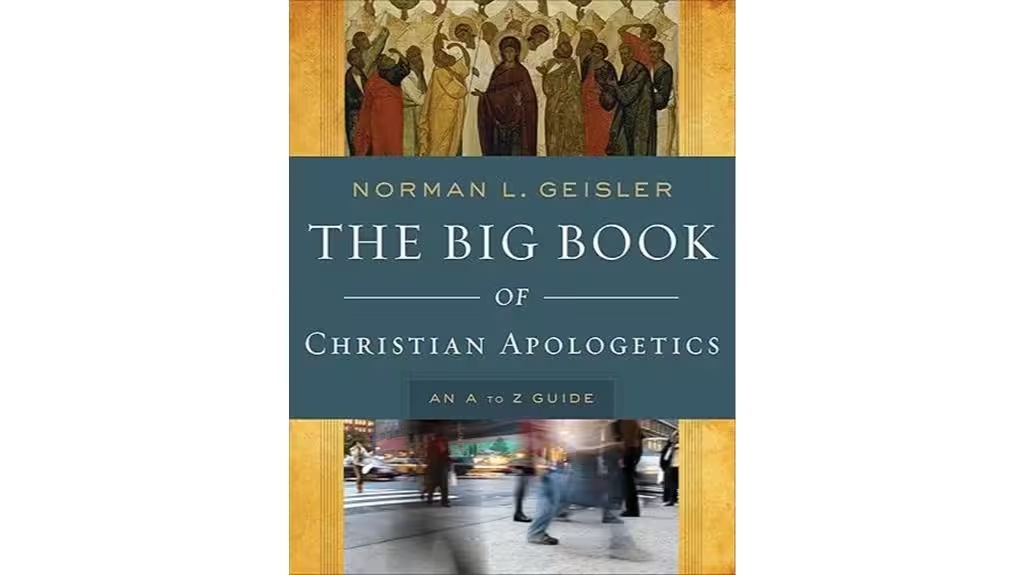
For anyone enthusiastic to deepen their understanding of Christian beliefs and defend their faith, "The Big Book of Christian Apologetics: An A to Z Guide" by Norman Geisler stands out as an essential resource. This thorough guide covers a wide range of topics relevant to apologetics, from scripture to history and philosophy. Each entry is succinct, typically spanning just 1 to 3 pages, making it perfect for quick reference. Readers appreciate how it strengthens their faith in God's Word and emphasizes the transformative power of Jesus Christ. While the writing can be dense at times, it challenges you to expand your knowledge. Overall, it's a worthwhile investment for anyone serious about exploring and understanding Christian truths.
Best For: Individuals seeking to deepen their understanding of Christian apologetics and defend their faith through a comprehensive and accessible resource.
Pros:
- Covers a wide range of topics in apologetics, including scripture, history, and philosophy.
- Each entry is concise, making it easy for quick reference and study.
- Strengthens faith in God's Word and emphasizes the transformative power of Jesus Christ.
Cons:
- The writing style can be dense, which may challenge some readers.
- Some topics, like the apocrypha, are not included, leading to gaps in coverage.
- Suggestions for improvements include a hardcover edition and a PDF table of contents for better usability.
Mere Christianity
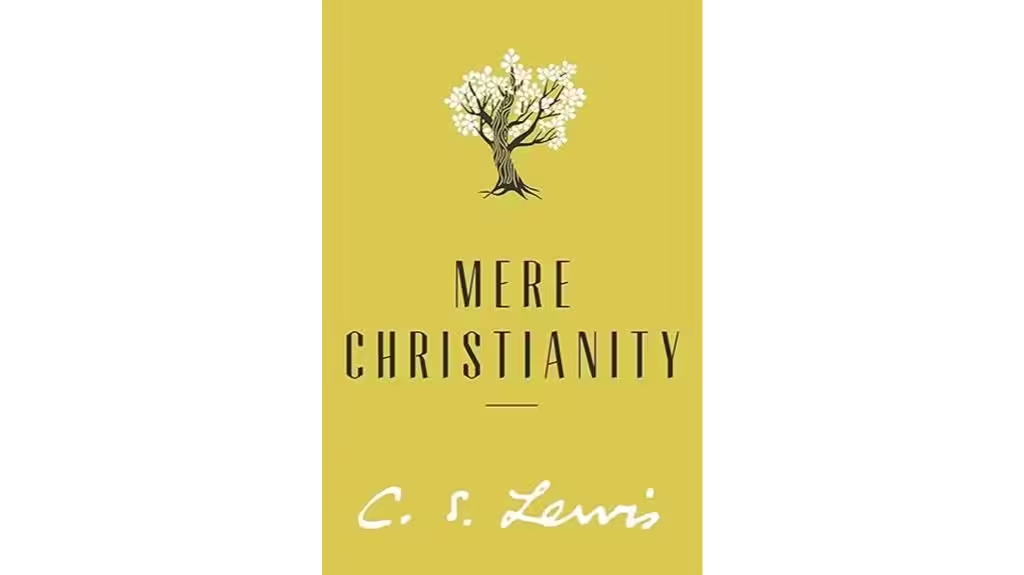
"Mere Christianity" stands out as an essential read for anyone seeking a deeper understanding of Christian beliefs, whether you're a believer or simply curious about the faith. C. S. Lewis, once an atheist, shares his unique perspective on morality and human nature, emphasizing the importance of a universal moral law. His conversational writing style, developed from radio broadcasts, makes complex ideas accessible. Lewis categorizes morality into actions, motivations, and our purpose, exploring how good and evil are intertwined. The book's timeless insights challenge readers to reflect on their moral responsibilities. I found it thought-provoking and enlightening, making it a valuable resource for anyone looking to grasp the essence of Christian beliefs and their real-world applications.
Best For: Those seeking a deeper understanding of Christian beliefs, whether they are believers or simply curious about the faith.
Pros:
- Engaging and accessible writing style that simplifies complex ideas.
- Offers a unique perspective from an author who transitioned from atheism to Christianity.
- Encourages reflection on moral responsibilities and the implications of choices.
Cons:
- Some readers may find the theological discussions challenging or dense.
- Perspectives may not resonate with individuals from non-Christian backgrounds.
- The book's age might make some references feel outdated or less relevant today.
I Dont Have Enough Faith to Be an Atheist
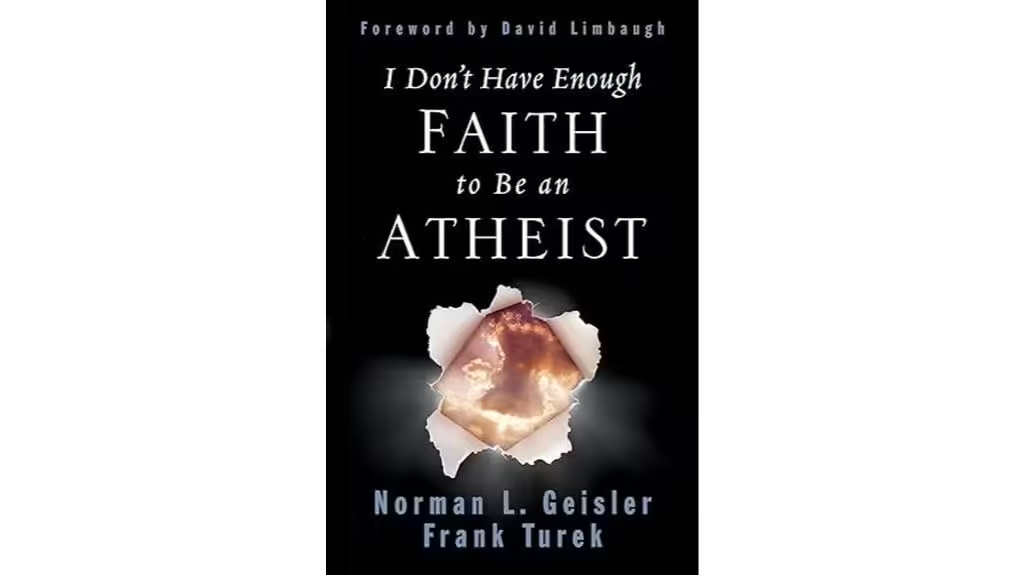
"I Don't Have Enough Faith to Be an Atheist" is an excellent choice for anyone grappling with doubts about their beliefs or seeking a deeper understanding of the arguments for Christianity. Drs. Geisler and Turek lay out a compelling 12-step argument for God's existence, touching on cosmological, teleological, and moral points. They emphasize that truth is knowable, making complex ideas accessible. I found their logical reasoning and integration of science, philosophy, and theology invigorating. The book doesn't just challenge Christians; it inspires agnostics and atheists to engage critically with their beliefs. While some critiques focus on the authors' credibility, I encourage you to immerse yourself in the content and explore its merits for yourself. This resource can truly deepen your understanding of faith.
Best For: Individuals seeking to deepen their understanding of Christianity or address doubts about their faith through logical reasoning and evidence.
Pros:
- Engaging Argumentation: Presents a compelling 12-step argument for God's existence, making complex philosophical ideas accessible.
- Interdisciplinary Approach: Integrates science, philosophy, and theology, appealing to a broad audience.
- Inspiring for All Beliefs: Challenges not only Christians but also agnostics and atheists to critically evaluate their beliefs.
Cons:
- Critique Focus: Some reviews may prioritize the authors' credibility or unrelated topics over the book's actual content.
- Emotional Responses: Critics often provide emotional rather than constructive feedback, which may detract from meaningful discourse.
- Classical Apologetic Method: Those who prefer presuppositionalism or evidentialism may find the approach less appealing.
Handbook of Christian Apologetics
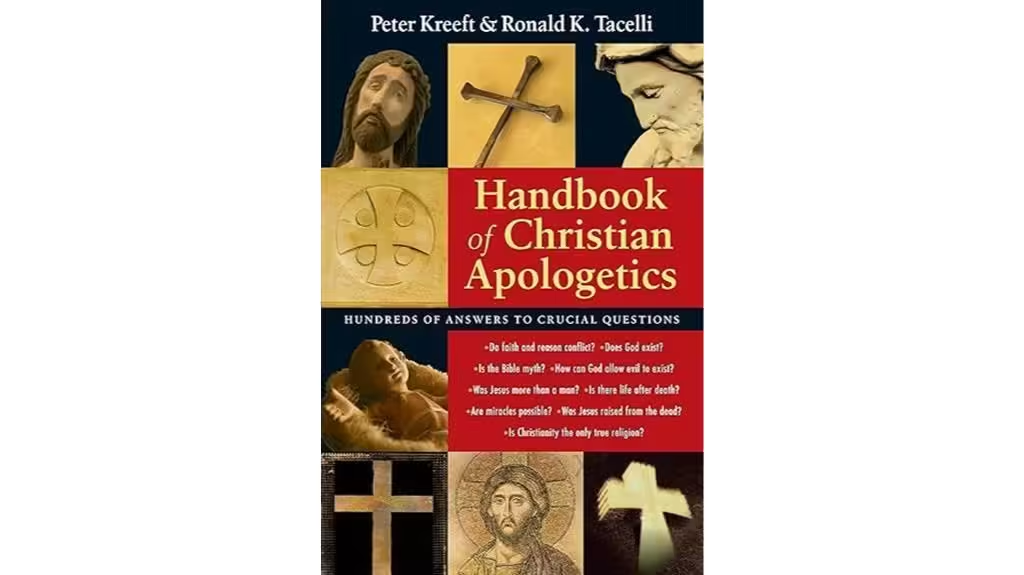
The "Handbook of Christian Apologetics" stands out as a go-to resource for anyone enthusiastic to explore the foundational aspects of Christian faith. Written by Peter Kreeft and Ronald Tacelli, this book offers a thorough yet engaging overview of key topics like the existence of God, the reliability of the Bible, and the resurrection of Jesus. I appreciate how it balances logical defense with accessible language, making it suitable for both believers and skeptics alike. While some critiques exist regarding certain arguments, the authors present their ideas thoughtfully and without bias. Whether you're questioning your faith or diving into academic studies, this handbook provides valuable insights that can strengthen your understanding of Christianity and its core principles.
Best For: Individuals seeking a comprehensive yet accessible resource to explore and understand the foundational aspects of Christian faith, including believers, skeptics, and students of theology.
Pros:
- Engaging and systematic overview of key Christian topics, making complex ideas more digestible.
- Balances logical arguments with accessible language, appealing to a broad audience.
- Valuable for personal faith exploration and academic studies, addressing tough questions effectively.
Cons:
- Some arguments for God's existence may be perceived as flawed or unconvincing by critics.
- The treatment of the fate of the unevangelized may come across as too liberal for certain readers.
- While comprehensive, the book may not delve deeply into every topic, leaving some areas less explored.
Factors to Consider When Choosing Christian Apologetics Books
When choosing Christian apologetics books, you should consider your target audience to guarantee the material resonates. Look into the author's background and credibility, as their expertise can greatly influence the book's reliability. Also, evaluate the content's depth, clarity, and writing style to find something that matches your understanding and interests.
Target Audience Consideration
Choosing the right Christian apologetics book can feel like steering through a vast library filled with diverse voices and perspectives. Understanding your target audience is essential, as different books cater to varying levels of faith and doubt. If you're a believer seeking reassurance, look for texts that affirm your faith. However, if you're a skeptic, opt for books that provide compelling evidence to address your questions.
Parents should consider offering apologetics books to their children, especially during college years when doubts about faith often surface. Newcomers to Christianity may benefit from introductory texts that systematically explain core beliefs and tackle common objections. These resources can help lay a strong foundation.
For those pursuing academic studies or theology, you'll want in-depth resources that provide thorough arguments and access to scholarly references. Finally, don't overlook your personal experiences with faith; if you have doubts, books that directly address and challenge those uncertainties might resonate with you more. By considering these factors, you'll be better equipped to select a book that not only strengthens your faith but also deepens your understanding of Christian apologetics.
Author's Background and Credibility
Selecting a Christian apologetics book requires careful consideration of the author's background and credibility. Start by looking at their academic qualifications and professional experience in theology or philosophy. An author with a solid educational foundation often presents more credible arguments. If they have a compelling personal journey, like a conversion from atheism to Christianity, that can offer relatable insights into complex faith-related topics.
Next, examine the author's reputation within both academic and religious communities. Published works and speaking engagements can indicate their expertise and influence in the field of apologetics. Additionally, consider how engaged the author is with contemporary issues and critiques. This engagement shows they're aware of current debates and challenges to faith, enhancing their credibility.
Lastly, check the author's affiliations with recognized institutions or organizations in Christian thought. These associations can help you assess their authority and reliability as a source. By evaluating these factors, you'll be better equipped to choose an apologetics book that strengthens your faith and understanding.
Content Depth and Clarity
While diving into Christian apologetics books, it's vital to evaluate both the depth of content and clarity of presentation. Look for books that thoroughly cover fundamental topics like the existence of God, the reliability of Scripture, and moral arguments. A well-rounded exploration guarantees you're getting a thorough understanding of key issues.
Clarity is just as important. Choose books that present complex ideas in accessible language, so you can engage meaningfully regardless of your educational background. Well-structured content helps you follow arguments easily, allowing you to explore specific topics without feeling overwhelmed.
Additionally, assess the use of evidence in the material. Effective apologetics should integrate historical, archaeological, and philosophical data to support claims, strengthening the arguments presented. This integration not only bolsters the author's credibility but also enriches your understanding.
Writing Style and Accessibility
Evaluating writing style and accessibility in Christian apologetics books is key to finding a text that resonates with you. The writing styles can vary greatly; some authors might choose a concise, academic approach that can feel dense, while others might adopt a conversational tone that's more engaging. Think about your own preferences—do you enjoy a more casual read, or are you comfortable diving into complex vocabulary and detailed arguments?
Accessibility is also vital. Some books challenge readers with intricate explanations, while others focus on presenting ideas in a straightforward manner. Look for texts that are well-organized, allowing you to navigate topics easily or providing summaries that help clarify key points.
You'll likely appreciate books that include bibliographies or further reading suggestions, as they can deepen your understanding and guide your exploration. Ultimately, finding a balance between depth of argumentation and clarity of expression is essential. Texts that present sophisticated concepts in an approachable way often appeal to a broader audience. So, consider these factors to choose a book that not only challenges you but also speaks to your understanding and faith.
Coverage of Key Topics
When you're choosing Christian apologetics books, it's essential to ascertain they cover significant topics that form the backbone of the faith. Start by looking for books that discuss key arguments for the existence of God, such as cosmological, teleological, and moral arguments. These foundational concepts are central to classical apologetics and will bolster your understanding.
Next, consider resources that provide evidence supporting the reliability of the Bible and the historical claims of Jesus. These topics are imperative in defending the Christian faith and addressing common doubts. A well-rounded book should also explore various aspects of Christianity, including scriptural studies, history, and philosophy, enhancing your overall perspective.
Don't overlook the importance of books that tackle common criticisms of Christianity. Thoughtful responses to these challenges are crucial for both believers and skeptics. Finally, verify the content is accessible and engaging. The best books cater to different levels of education and backgrounds in theology, making complex ideas easier to grasp. A book that communicates effectively will maximize its impact on your understanding of apologetic concepts.
Practical Application of Ideas
Practical application of the ideas found in Christian apologetics books can greatly enhance your faith journey and help you address real-life doubts or questions about belief. When selecting a book, consider how its arguments can be applied to your personal faith. Look for resources that provide clear, logical frameworks for understanding Christian doctrines; these will often translate well into real-world applications.
Evaluate whether the book includes real-life examples or case studies that showcase the relevance of theological concepts in everyday situations. This will aid in your understanding and help you see how faith can operate in daily life. It's also essential to assess the clarity and accessibility of the writing style. A book that presents complex ideas simply will make it easier for you to integrate these concepts into your belief system and discussions with others.
Recommended Reading Format
Choosing the right format for Christian apologetics books can make a significant difference in how you absorb and engage with the material. Start by considering whether you prefer concise summaries for quick reference or a more detailed exploration of topics. This choice directly affects how deeply you can immerse yourself in the subject matter.
Next, evaluate the book's structure. Look for clear sections or a topical index that helps you find specific information quickly. This can save you time and make your study more efficient. It's also beneficial to choose books that include bibliographies or further reading suggestions, enhancing your understanding and allowing for deeper exploration.
Pay attention to the writing style as well. Some books are academic and dense, while others adopt a conversational tone that's more engaging for general readers. Finally, think about the reading format that suits your lifestyle. A hardcover might offer durability, while digital formats provide portability and ease of access, perfect for on-the-go learning. By considering these factors, you can select the right apologetics books that will enrich your faith and understanding.
Availability of Additional Resources
Selecting Christian apologetics books isn't just about the content and format; it's also important to contemplate the availability of additional resources that can enrich your learning experience. Many authors include bibliographies at the end of each chapter, guiding you toward further reading and deeper exploration of key topics. This feature can noticeably enhance your understanding.
Additionally, some authors provide companion websites filled with articles, lectures, and discussion forums, allowing you to dive deeper into the material. If you're studying in a group setting, look for books that come with educational curricula tailored for church classes or academic environments. These resources can facilitate discussions and shared learning.
You might also appreciate books that are accompanied by related videos or podcasts. These formats can help reinforce the concepts you're reading about, offering a multi-dimensional approach to your studies. Finally, consider whether the book grants access to community platforms where you can connect with others interested in Christian apologetics. Engaging with a community can deepen your insights and encourage lively discussions, making your learning journey even more fulfilling.
Frequently Asked Questions
What Is the Primary Goal of Christian Apologetics?
The primary goal of Christian apologetics is to defend and explain your faith. It's about providing reasoned arguments and evidence that support the beliefs you hold. By engaging with questions and challenges, you strengthen your understanding and confidence in your faith. You're not just answering skeptics; you're also deepening your own relationship with God. Ultimately, it's about helping others see the truth and relevance of Christianity in their lives.
How Can I Apply Apologetics in Daily Conversations?
You can apply apologetics in daily conversations by confidently sharing your beliefs and engaging in respectful discussions. When someone raises a question or challenge, listen carefully and respond thoughtfully. Use your knowledge to clarify misconceptions and provide reasons for your faith. Encourage open dialogue, and don't shy away from tough topics. By demonstrating empathy and understanding, you'll create an environment where meaningful conversations can flourish, helping both you and others grow in your understanding.
Are There Online Resources for Christian Apologetics?
Absolutely, there are plenty of online resources for Christian apologetics. You can explore websites like Reasonable Faith and the Christian Apologetics Alliance, which offer articles, videos, and discussions. Podcasts like Stand to Reason and The Apologetics Podcast provide insightful conversations on various topics. You'll also find YouTube channels dedicated to defending the faith, making it easy to engage with apologetics on the go. Immerse yourself and enrich your understanding today!
How Do I Know Which Apologetics Book to Start With?
Choosing an apologetics book can feel overwhelming, but start by considering your current knowledge level and interests. If you're new to the topic, look for beginner-friendly titles that explain fundamental concepts clearly. If you're more advanced, seek books that challenge your understanding. Check reviews and recommendations from trusted sources, and don't hesitate to explore a few options. Remember, it's about finding a book that resonates with you and sparks your curiosity.
What Is the Difference Between Apologetics and Evangelism?
Imagine a bridge connecting two islands—apologetics and evangelism. Apologetics is like the sturdy foundation, providing reasons and defenses for your beliefs. It strengthens your understanding and equips you to answer questions. Evangelism, on the other hand, is the vibrant pathway, guiding others across the bridge to faith in Christ. You'll find that while they're interconnected, one focuses on defending faith, and the other actively shares it with the world.
Wrapping Up
In your journey of faith, these apologetics books are like sturdy lighthouses, guiding you through the fog of doubt and confusion. They'll arm you with knowledge and confidence, helping you stand firm against the waves of skepticism. As you immerse yourself in their pages, expect your understanding to deepen and your faith to blossom. So, grab one or all of these gems, and let their wisdom light your path toward a richer, more resilient belief.
